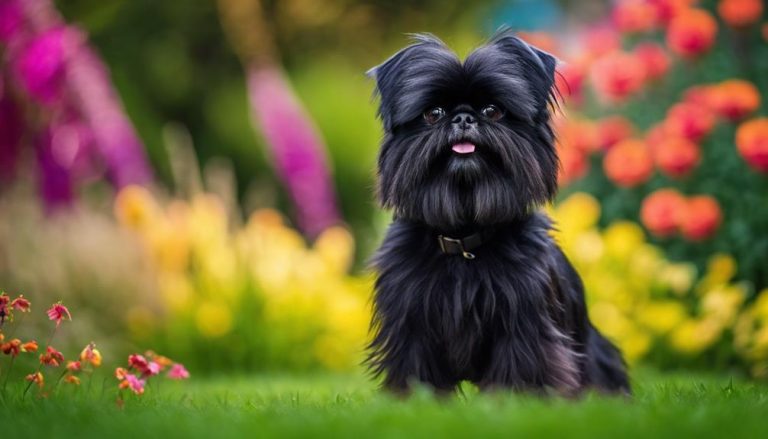Affenpinscher: Petite and Spirited Canine
The Affenpinscher breed, hailed from Germany in the 17th Century, became officially recognized by the AKC in 1936. Known for its playful and curious nature, this small dog typically tips the scales at 7-10 pounds and can live for 12-15 years. Standing 9-11.5 inches tall, it sports a unique wire-haired coat that’s usually black or brown and has mustache-like facial hair, contributing to its expressive face.
Regular grooming is a must for this breed, and despite its compact size, it thrives on daily activities and brain games to stay healthy. Hip dysplasia and knee issues are common health concerns, highlighting the importance of attentive care for prospective owners.
Key Takeaways
- Affenpinschers, German since the 17th Century, are charming and curious.
- Ideal for apartment living, they weigh 7-10 pounds, living 12-15 years.
- They sport a wire-haired coat and mustache, requiring regular grooming.
Quick Facts
The Affenpinscher, originally from Germany and part of the Toy breed group, is a unique type of dog. It’s known for its wire-haired coat, which usually comes in black or brown. This breed has a life expectancy of 12-15 years and typically weighs 7-10 pounds. It stands 9-11.5 inches, making it a small yet sturdy companion. Despite being ranked 148 out of 201 in popularity by the American Kennel Club (AKC), the Affenpinscher has a loyal fan base.
The coat of an Affenpinscher doesn’t just look good; it also provides protection. Regular grooming is needed to keep its coat in top condition. This breed is known for being robust and full of life, with traits reflected in its lifespan and size. Although small, the Affenpinscher has a muscular build that returns to its origins as a working dog. Today, it’s more commonly seen as a companion dog.
Overview
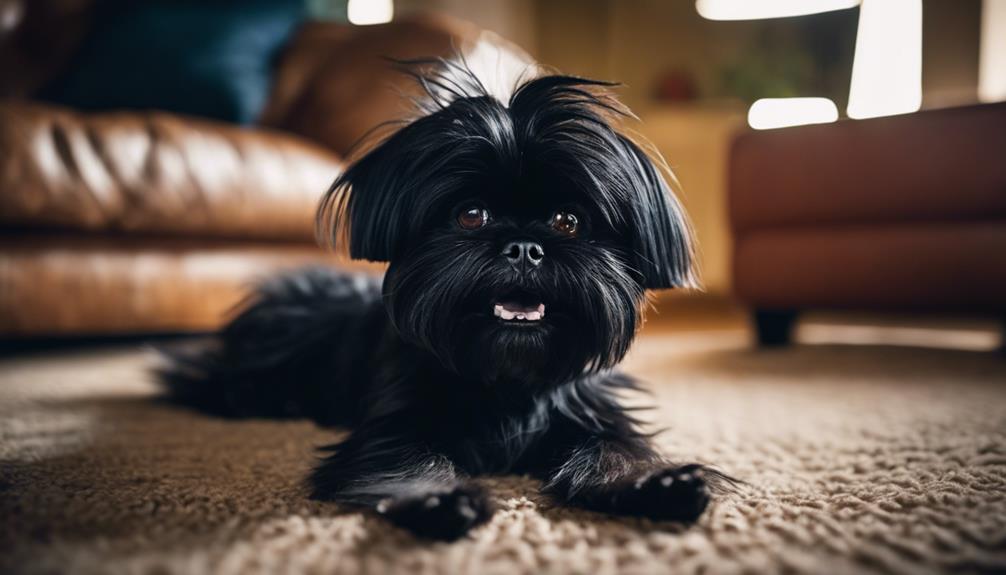
The Affenpinscher, recognized for its unique looks and personality, is a prime example of a dog breed that makes an excellent companion and adapts well to different environments. This breed was officially recognized by the American Kennel Club (AKC) in 1936, which marked its acceptance into the broader dog community. With its large, expressive eyes, noticeable lower jaw, and rounded head, the Affenpinscher has a distinct look.
Known for being charming, alert, and curious, the Affenpinscher loves to play. This energetic and lively breed makes it a great addition to many homes. While they generally get along with kids, their patience can run thin with rough play, so it’s wise to supervise interactions.
Taking care of an Affenpinscher’s coat involves regular grooming to keep shedding under control, which is crucial for this hypoallergenic breed. Proper grooming keeps them looking good and promotes their health, emphasizing the need for regular care.
Mustache-Like Facial Hair
Moving on from the general care and traits of the Affenpinscher, it’s time to focus on a standout feature: its mustache-like facial hair. This adds to its adorable look and creates a playful and cheeky vibe. The facial hair makes the Affenpinscher look like a little noble, often being compared to miniature ‘gentlemen’ or ‘ladies.’
Here’s a simple breakdown of this characteristic:
| Feature | Description | Impact on Appearance |
|---|---|---|
| Length | Usually quite noticeable | It makes the dog look more expressive and fun |
| Texture | It can vary but is often rough | It adds a touch of ruggedness |
| Maintenance | Needs regular care | It helps keep the mustache tidy, preserving the breed’s noble appearance. |
| Perception | Viewed as adorable and unique | Highlights the Affenpinscher’s special charm |
| Function | Purely for looks | Supports the breed’s cheeky grin |
This facial feature is more than just for show; it gives the Affenpinscher a unique personality trait that sets it apart. Regular grooming is vital to maintaining its distinguished look, ensuring the mustache remains a focal point of its charming expression.
Origins in the 17th Century
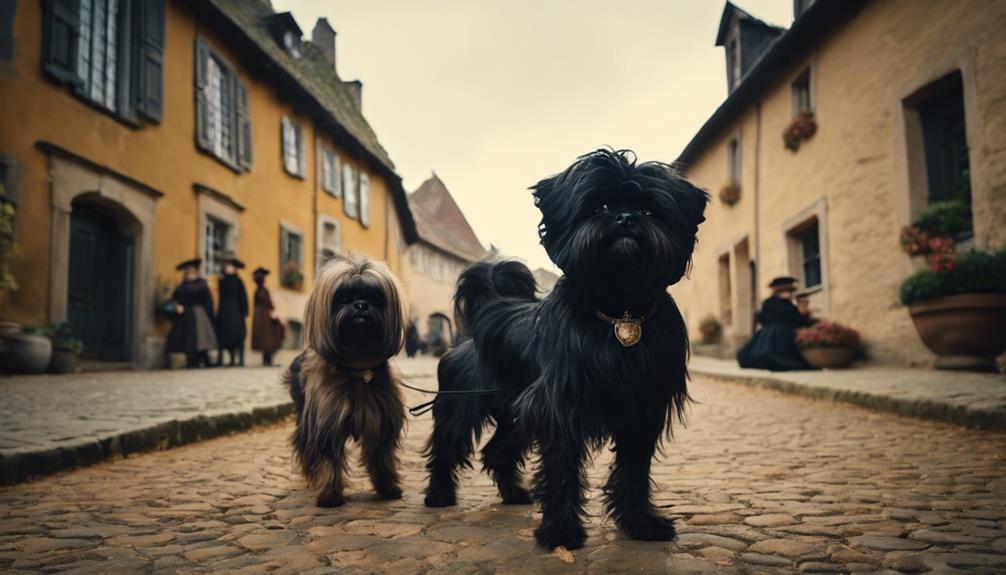
The Affenpinscher, a breed rooted in the 17th Century, stands out due to its unique features and purpose. Originating from Europe, this dog became well-known for its role in pest control, showcasing a practical use beyond companionship. Its distinct, monkey-like face contributes to its charm and sets it apart in the dog world.
- European Beginnings
- Roles and Recognition
- Key Milestones in Breed Acknowledgment
The journey of the Affenpinscher from a working dog to a beloved pet highlights its versatility and enduring appeal. Recognized for its contributions and distinct look, this breed has carved a significant place among dog enthusiasts. Its acknowledgment in dog registries underlines its historical and cultural significance, emphasizing its role in shaping the modern landscape of pet ownership.
Early European Roots
The Affenpinscher, a dog breed that traces back to 17th-century Germany, was initially bred for tasks like catching rats in carriages and stables. Known back then as Deutscher Pinschers, these dogs were sorted into two types based on their coats: rough and smooth. This division highlights how well-suited they were for various jobs from their early days in Europe. Records dating back to around 1600 show that dogs looking much like today’s Affenpinscher were already part of European dog families, marking a long history for this breed.
Although they show terrier-like qualities, Affenpinschers are officially placed in Group 2, setting them apart from the terrier breeds. This classification points to a deeper appreciation of what makes the Affenpinscher unique, focusing on their specific characteristics and the roles they played historically. It shows the breed’s unique place in the wide world of dogs.
Development and Purpose
In Germany during the 17th Century, Affenpinschers were bred with a specific skill: controlling the rat population. Initially, these dogs excelled as rat catchers in stables and carriages, a necessary and valued job.
Their German name, ‘monkey dog,’ hints at their unique facial features. These features were not just for show; they made the Affenpinschers agile and adept at squeezing into tight spaces to chase after rodents.
This era was pivotal for the breed, transforming Affenpinschers into the lively and endearing pets we know today. They moved from being efficient workers to becoming cherished family members.
Breed Recognition Milestones
With roots in 17th-century Germany, the Affenpinscher breed represents a notable moment in dog breed history. These dogs were initially bred to eliminate rats in stables and carriages, proving their worth beyond being pets. They were part of the Deutscher Pinscher group, which included rough and smooth-coated dogs, showing the breed’s flexibility. Since around 1600, Affenpinschers have been celebrated for their distinct looks and behaviors, underlining a long history of admiration. Interestingly, despite a common mix-up, Affenpinschers are not part of the terrier group but belong to Group 2. This classification highlights their unique heritage and role in the world of dogs.
Affenpinschers have a special place due to their unique appearance and historical importance. This recognition is vital because it helps us understand their contribution as companions and working animals. Their past to present story shows the evolving relationship between humans and dogs, reflecting on how breeds have been shaped to meet specific needs. This history and classification of the Affenpinscher underscore the breed’s unique place in our lives and hearts.
Toy Breed Dimensions
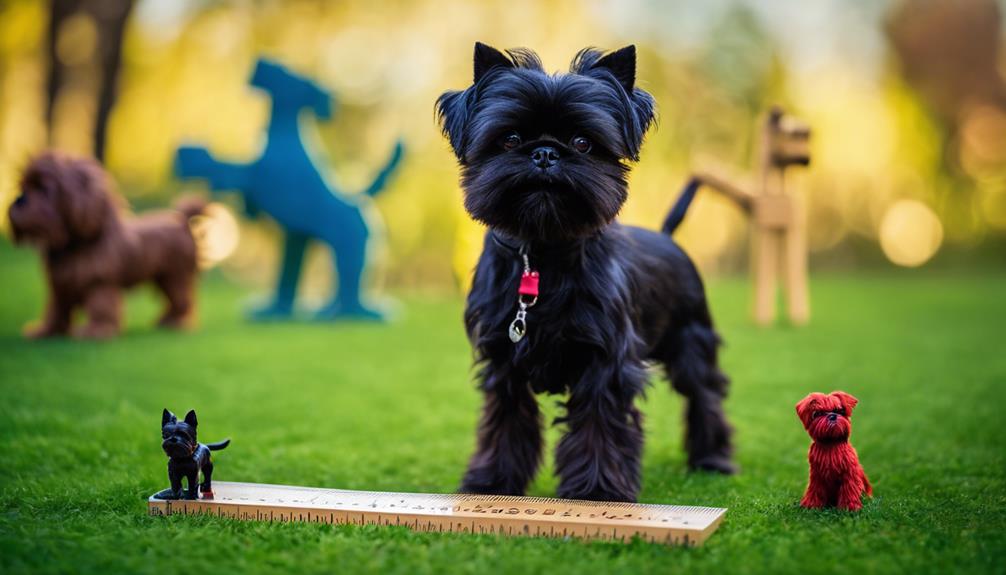
The Affenpinscher, a toy breed dog, has characteristics that stand out, especially when considering size and weight, directly influencing their care needs and the home environment they’ll do best in. These small dogs have specific requirements that must be met to lead happy, healthy lives. We’ll touch on three key aspects: their physical dimensions, their best living situations, and health issues to watch out for.
Physical Dimensions
The Affenpinscher is a small dog, but what they lack in size, they make up for in personality. Their weight and build mean they need a living space that accommodates their size but doesn’t restrict their need for movement and play.
Ideal Living Spaces
These dogs do well in apartments or homes with limited space as long as they exercise regularly. It’s not just about having a roof over their heads; it’s about creating an environment where they can thrive, with enough space for play and relaxation.
Health Considerations
Being aware of the breed’s common health issues is crucial. Regular vet check-ups can prevent or manage health problems, ensuring a quality life for these dogs. Their small size doesn’t make them fragile, but it does mean they have specific health needs that can’t be ignored.
Size and Weight
Affenpinschers are small, portable companions, perfect for those living in tight spaces. They measure 9 to 11.5 inches in height and weigh between 7 to 10 pounds, showcasing their role as ideal toy breeds.
Despite their small size, they don’t compromise on strength or agility. These dogs are known for being easy to manage and resilient, making them great for anyone looking for a small but hardy pet.
Their size and weight make them a top choice for a well-balanced, agile, and durable companion.
Ideal Living Spaces
Creating the perfect home for small dog breeds like Affenpinschers involves understanding their needs. These dogs do well in apartment settings because of their small size and calm nature. It’s important to consider how close you are to your neighbors when deciding if a small dog is suitable for your apartment. Affenpinschers may be small, but their behavior and energy levels can affect how well they fit into apartment living.
They are setting boundaries, teaching them basic commands, and keeping them on a leash when outside are vital in helping them adjust. These steps help create a peaceful living situation and prevent issues with neighbors. The focus on behavior and size shows how to make a good match between Affenpinschers and their living spaces.
Health Considerations
Understanding the health challenges of Affenpinschers is critical due to their small size. These dogs usually live up to around 11.4 years, which is suitable for a toy breed. But, like all dogs, they can face specific health problems. They often deal with old age and urinary system issues, so monitoring their health is essential.
Common problems in Affenpinschers include hip dysplasia, a weak trachea, and knee issues. These can affect how they enjoy life. Problems with their eyes, like cataracts, can also be a concern, making regular vet visits crucial. Catching these issues early and managing them well is vital for the well-being of these dogs.
Exercise Needs
Meeting the exercise needs of Affenpinschers is crucial for their health and to avoid common health problems. Although small, Affenpinschers need daily walks and playtime to stay happy and healthy. It’s also essential to keep their minds active. Using interactive toys and doing training exercises can help. Adding agility or obedience training into their routine offers physical and mental challenges.
Mental stimulation and physical activity are essential for Affenpinschers. This combination helps prevent boredom and keeps them in good shape. Remember, a balanced mix of exercise and mental challenges is necessary for their well-being.
Grooming Tips
Affenpinschers have a unique wire-haired coat that requires special grooming to keep it looking its best. These small dogs come in black or brown and need consistent care to manage their fur. Stripping their coat a few times each year is crucial. This process removes dead hair, helps control shedding, and keeps the coat tidy.
Regular use of a slicker brush prevents mats and tangles, which are crucial for their coat’s health and appearance. Trimming around the eyes and ears is necessary to keep these areas clean and irritation-free. When it comes to bathing, gentle dog shampoo is best, and the frequency should depend on how dirty or smelly the dog gets, ensuring their coat remains healthy and vibrant.
Mischievous and Confident
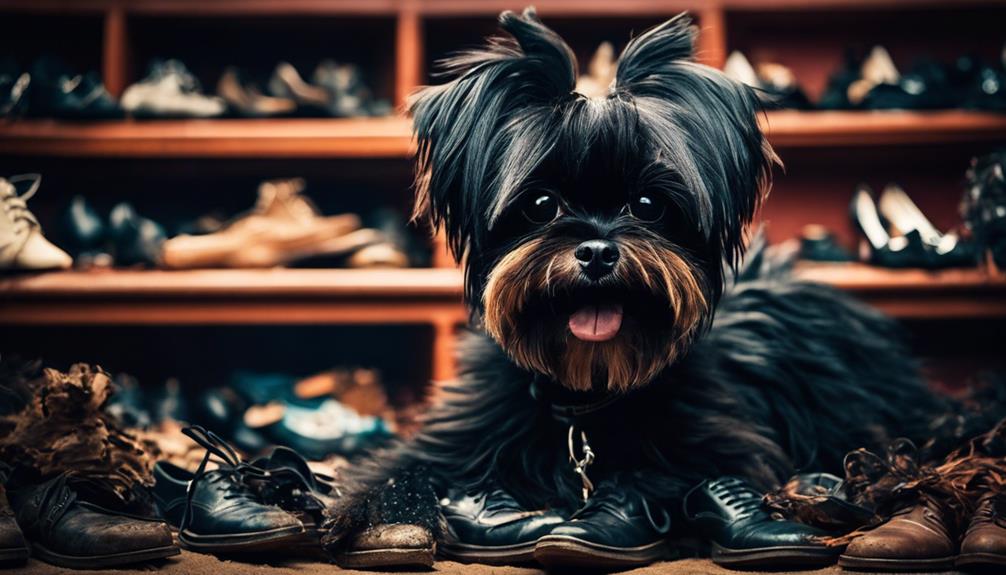
The Affenpinscher breed stands out for its mix of playfulness and self-assurance, the key to understanding how they behave and interact. Their boldness and love for fun call for a focused training method that relies on regular reinforcement and positive feedback to guide their energy correctly. It’s also crucial to start socializing them early to help them become well-adjusted and to prevent any issues with dominance or being overly territorial.
- Character Traits: Examining their self-assured yet fun-loving nature and how this affects their relationships with people and other pets.
- Overcoming Training Hurdles: Tackling their sometimes stubborn behavior and using their smarts for successful training.
- Handling Their Playful Side: Finding ways to channel their curiosity and love for games into activities that stop bad behavior before it starts.
The Affenpinscher is known for being cheeky and confident, shaping their interactions and how they carry themselves. This combination requires a training approach that is both regular and encouraging, helping them use their lively energy positively. Additionally, teaching them to be friendly from a young age is vital for a well-rounded personality. It reduces their chances of becoming too controlling or protective over their space.
- Traits to Know: Exploring their confident and playful nature and its impact on their dealings with humans and fellow animals.
- Tackling Training Challenges: Approaches to deal with their sometimes obstinate behavior and harness their intellect for successful training.
- Directing Their Curiosity: Strategies to transform their natural inquisitiveness and fondness for play into beneficial activities, thus avoiding unwanted actions.
Personality Traits
Affenpinschers are known for their mischievous and bold nature, making them charming and attentive companions. Their personality shines through with a mix of terrier energy and bravery, showing deep loyalty and love for their families.
These small dogs are skilled at using their paws to play with toys, revealing their fun-loving and persistent spirit. However, they’re not the most patient with high-energy play from kids and may not get along well with smaller pets due to their assertive nature.
This behavior is a nod to their terrier roots and fearless character.
Training Challenges
Training Affenpinschers, known for their mischievous and confident traits, can be quite a task due to their strong-willed and independent streak. This behavior becomes evident in sessions focused on obedience and learning new skills. Their confident nature might lead to hesitance in following commands and traditional training methods, making it essential to find ways to engage their bright and curious sides.
The tendency of these dogs to push limits and show stubbornness highlights the importance of trainers being consistent and patient. To tackle the training challenges of Affenpinschers, using creative and engaging techniques is critical to keeping them interested. Positive reinforcement and rewards are crucial in overcoming the difficulties of training these lively and intelligent dogs.
Social Behavior
Affenpinschers are known for their mischievous and confident behavior, making them fun and bold partners in various social settings. Despite their small size, they don’t hesitate to interact confidently with both people and other dogs. Their fearless approach to socializing makes them amusing companions and highlights their lively nature.
Their playful attitude and eagerness to engage make every interaction with an Affenpinscher a unique and lively experience. This breed’s boldness is vital to their personality, shaping how they connect with the world around them. They bring energy and enthusiasm to their encounters, making their company enjoyable.
Playful Antics
Affenpinschers are known for their playful nature and confidence and often engage in fun activities. Despite their small size, these dogs are fearless and love to show off their lively and spirited personalities through their actions.
They enjoy playing with toys, using their front paws to skillfully throw and catch, which adds excitement to their interactions. The serious look on their faces makes their playful behavior even more amusing, creating a charming mix of characteristics.
Affenpinschers are loyal and curious pets, always ready to join in on activities that highlight their energetic spirit. They make excellent companions, bringing laughter and joy to their owners with their naughty behaviors.
Managing Mischief
Training and socializing an Affenpinscher requires an intelligent approach that makes the most of their playful yet bold nature. Despite their small size, these dogs are courageous and love to get into all sorts of mischief. They’ll often sneak into tight spots or play tricks, showcasing their lively spirit. Staying consistent yet flexible in your training methods is crucial to handle their sometimes stubborn streak. This ensures their energetic personality shines through in a positive, well-behaved manner.
A crucial part of managing an Affenpinscher is understanding how to direct their adventurous spirit constructively. Since they’re naturally confident and enjoy a bit of chaos, your training strategy should focus on activities that engage their curiosity without leading to trouble. Ensuring they’re well-behaved involves patience, consistency, and adaptability from your side. This combination helps channel their zest for life in ways that complement their surroundings and keep everyone happy.
Lifespan and Common Ailments
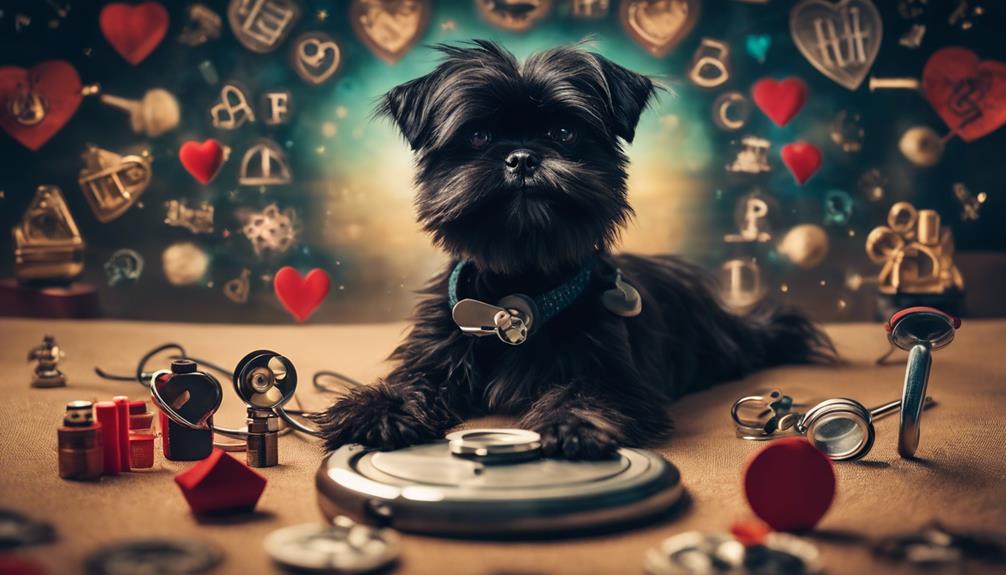
Affenpinschers are known for their longevity, typically living 12 to 15 years. Their lifespan depends mainly on their health and how well they’re cared for. These dogs face several health issues, including problems with their bones and joints like hip dysplasia and luxating patella, breathing difficulties such as a collapsed trachea, and issues with their eyes and heart. Regular visits to the vet for check-ups and preventive care are crucial in keeping these problems at bay, ensuring they live a whole and happy life.
Average Lifespan: Affenpinschers have a good chance at a long life, especially when their genetic background is strong and they receive attentive care.
Health Challenges: They are prone to specific health issues, primarily in their bones and joints, respiratory system, and vision and heart health. Recognizing and treating these conditions early is critical.
Preventive Care Tips: Keeping an Affenpinscher healthy involves routine vet visits for early detection of common issues and adopting a care plan tailored to their specific needs. This approach helps prevent the onset of severe health complications.
Employing a straightforward and engaging approach, it’s clear that the health and happiness of Affenpinschers hinge on proactive care and an understanding of their unique health needs. Regular check-ups and a keen eye for the first sign of trouble can make all the difference in their quality of life.
Average Lifespan
Affenpinschers, small but sturdy dogs, typically live 12 to 15 years. Their longevity surpasses many other breeds of similar size thanks to their resilience against common health issues. The secret to their long lives includes good genetics, proper health care, and lifestyle choices that reduce disease risk.
Feeding them a well-balanced diet, keeping them healthy, and ensuring they get plenty of exercise are essential. Regular vet visits help catch and treat any health problems early, supporting their overall health and extending their lifespan.
Health Challenges
Although naturally sturdy, Affenpinschers face several health challenges impacting their life quality and duration. They typically live about 11.4 years, reaching up to 15 years if they’re in excellent health. However, they are prone to a variety of issues. Orthopedic problems like hip dysplasia and patellar luxation are common, as well as respiratory and urinary diseases, which are significant causes of death in these dogs. They also might suffer from eye issues such as cataracts, liver shunts, heart conditions, neurological problems, and skin issues.
Conditions like a collapsed trachea and heart murmurs highlight the importance of regular health checks and care. This proactive approach can help manage these conditions and support a happy, healthy life for Affenpinschers.
Preventive Care Tips
Given Affenpinschers’ health challenges, it’s essential to focus on preventive care to keep them healthy and extend their lives. Affenpinschers live for about 11.4 years on average, but issues like hip dysplasia, trachea problems, knee issues, and eye conditions such as cataracts can shorten their lifespan. They’re also prone to orthopedic, liver, heart, neurological, and skin problems, so a proactive approach to their health is critical.
Taking care of an Affenpinscher involves regular check-ups with the vet, a diet that meets all their nutritional needs, keeping them at a healthy weight, ensuring they get plenty of exercise, taking care of their teeth, and keeping up with flea and tick prevention. By closely following these steps, you can lower the chances of common health problems in Affenpinschers and help them lead a longer, happier life.
Grooming Needs
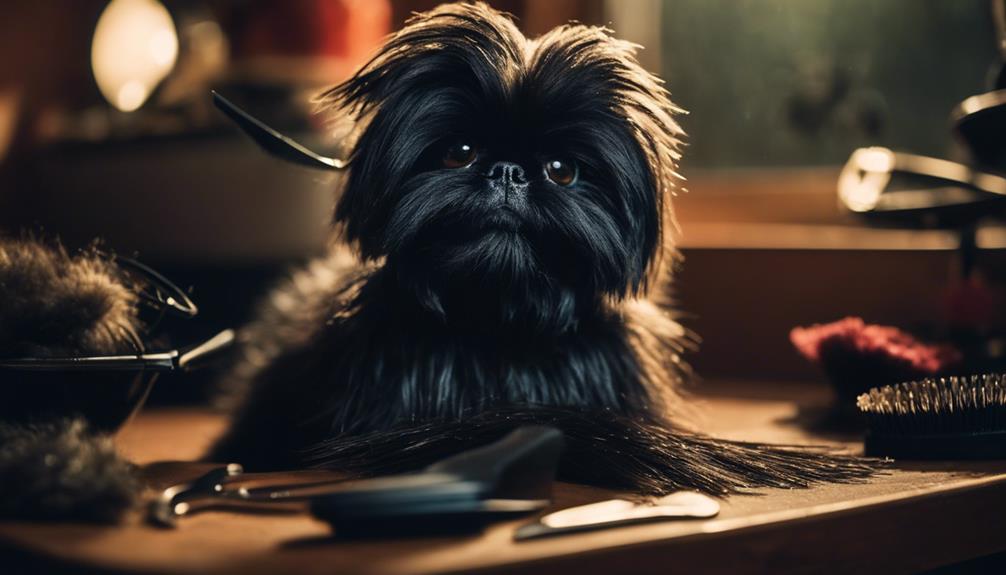
For Affenpinschers, a comprehensive grooming routine is pivotal for their appearance and health. This breed demands attention to its distinctive coat and nail care, ear cleaning, and teeth cleaning. Following grooming practices ensures these dogs look and feel their best.
Coat Care Essentials: A regular brushing, hand-stripping, and bathing schedule is vital. This keeps their coat in top condition.
Brushing Frequency Tips: A consistent brushing routine helps avoid mats and keeps the coat’s wiry texture intact.
Nail Trimming Guide: Cutting nails at the right frequency and using the correct technique are essential for the dog’s comfort and preventing problems from too-long nails.
Affenpinschers thrive with a grooming routine that addresses all aspects of their care. Proper grooming keeps them looking sharp and supports their overall well-being.
Coat Care Essentials
Affenpinschers have a distinctive wire-haired coat that needs regular brushing to avoid tangles. To keep their unique look, they also need routine grooming and stripping. It’s not just about brushing; this breed requires special grooming to look its best.
Trimming around their eyes and ears is essential to keep them comfortable and clean, which is good for their health. Although Affenpinschers are often seen as low-shedding and suitable for allergy sufferers, they do lose some hair. Regular grooming reduces shedding and keeps their coat in top condition.
Taking care of their coat with these grooming methods helps Affenpinschers look and feel great.
Brushing Frequency Tips
Brushing an Affenpinscher at least twice or thrice a week helps prevent their coat from tangling and evenly spreads their natural skin oils. Using a slicker brush or a specific comb is critical to removing loose fur and dirt, which keeps their coat looking good and healthy.
To avoid mats, focus on areas that easily knot, like behind the ears, under the legs, and near the tail. Regular grooming by a professional every four to six weeks keeps their coat in top condition and reduces shedding. This keeps your Affenpinscher’s coat shiny and vibrant.
Nail Trimming Guide
Taking care of an Affenpinscher’s coat isn’t enough; regular nail trimming is crucial for keeping their paws healthy and ensuring they’re comfortable. When nails get too long, it can hurt the dog, making walking uncomfortable and potentially leading to skeletal issues.
The key to trimming nails properly is avoiding the sensitive area known as the quick, which contains nerves and blood vessels. Cutting into the quick is painful for the dog and can cause bleeding, highlighting the need for the right tools and a steady hand.
Owners should learn about their dog’s nail structure and practice trimming with care to avoid any accidents. Making nail trimming a routine part of your Affenpinscher’s grooming can prevent discomfort and keep their paws in good shape, contributing positively to their overall well-being.
Bathing Routine Advice
Regular bathing is crucial for keeping an Affenpinscher’s coat healthy and clean. These dogs need moderate grooming, so plan for a bath every 2-4 weeks using a gentle dog shampoo. Make sure to rinse their coat to prevent skin irritation thoroughly.
Regular brushing and combing are necessary since their wiry coat can easily get matted and tangled. This also makes the grooming process more effective.
After a bath, it’s essential to dry your Affenpinscher completely to avoid any skin problems or discomfort. Consider using professional grooming services for more complex needs to ensure your Affenpinscher’s coat stays in top condition.
Ear Cleaning Practices
Caring for your Affenpinscher’s ears is crucial to their grooming routine. It’s recommended that their ears be cleaned once a week using a dog-specific ear-cleaning solution. This approach helps in keeping their ears healthy and free from infections.
When cleaning, it’s essential to be gentle and not to insert anything deep into the ear canal, like cotton swabs, to avoid causing harm. Always look for signs of ear problems, such as redness, swelling, odor, or discharge. Catching these signs early can make a big difference in preventing serious issues.
Maintaining a consistent ear cleaning schedule ensures your Affenpinscher stays happy and healthy. This practice not only helps in preventing ear infections but also contributes significantly to their overall well-being.
Dietary Requirements

Ensuring Affenpinschers have a well-rounded diet is crucial to their health and lifespan. It’s essential to get their nutrition right, with a balanced mix of ingredients, a feeding schedule that suits their needs, and keeping an eye on their weight to avoid issues.
1. Essential Nutrients Needed: Affenpinschers thrive on a diet that includes the right balance of vitamins, minerals, proteins, fats, and carbohydrates. Knowing what nutrients your dog needs helps prevent health problems and keep them in top shape.
2. Feeding Schedule Recommendations: It’s best to feed them according to their age and how active they are. Younger and more active dogs might need more food spread over the day, while older, less active dogs might do better with less.
3. Managing Weight Issues: Keeping an Affenpinscher at a healthy weight is crucial. Regular check-ups and adjusting their diet as needed can help avoid obesity and the problems that come with it.
A balanced diet, proper feeding times, and weight control are all important to keep Affenpinschers healthy. Ensure that you give them the right mix of nutrients, feed them based on their activity level and age, and keep their weight in check to avoid health issues.
Essential Nutrients Needed
A balanced diet with plenty of high-quality protein is critical for Affenpinschers to keep up with their active lifestyle and small size. Proteins are vital for tissue growth, repair, and keeping their muscles in good shape. This is why they’re an essential part of an Affenpinscher’s food.
Along with proteins, it’s crucial to include omega-3 fatty acids for healthy skin and fur and a mix of vitamins and minerals to help with metabolism and keep their immune system strong. Drinking enough water is also essential to avoid urinary and kidney problems that small dogs sometimes face.
It’s best to talk to a vet to get a diet plan that’s right for your Affenpinscher’s unique needs, like their age, weight, and how active they are, instead of going for a one-size-fits-all approach or giving them people food that might not be good for them.
Feeding Schedule Recommendations
Knowing what Affenpinschers need to eat is vital for their health. They should have a high-quality diet suitable for their age and their activity. Puppy Affenpinschers need to eat more often to help them grow properly. Adult Affenpinschers do well with two meals daily to keep their energy levels steady.
Feeding them at the exact times every day to avoid stomach issues and help keep their weight in check is essential. A vet can advise how much and how often to feed your Affenpinscher to keep them healthy.
Managing Weight Issues
Proper nutrition and exercise are crucial to preventing weight problems in Affenpinschers, which helps avoid health issues linked to obesity. These small dogs need a well-balanced diet that matches their size and activity level to avoid gaining extra weight. Overfeeding can lead to obesity, making them more likely to suffer from joint problems and heart disease.
It’s important to talk to a vet to determine the right amount of food and how often to feed your Affenpinscher. Keeping them active is crucial for maintaining a healthy weight and overall well-being. Regularly checking their weight and body condition helps catch any weight problems early, ensuring they live a long and healthy life.
Frequently Asked Questions
Is Affenpinscher a Good Family Dog?
- Affenpinschers adapt well to family life with proper training.
- Their loyalty makes them great companions.
- Proper interaction with kids is critical.
Are Affenpinscher Aggressive?
- Affenpinschers may show aggression from fear or insecurity.
- Proper care and socialization reduce aggression risks.
- Aggression isn’t a natural trait in these dogs.
What Two Dog Breeds Make an Affenpinscher?
- Affenpinschers are a mix of German Pinscher and Brussels Griffon.
- This combination created a breed with distinct features.
- They’re known for their unique personality and appearance.
How Much Does an Affenpinscher Cost?
- Purchasing from breeders costs $1,000 to $2,500.
- Adopting fees range from $50 to $500, not including care costs.
- Healthcare and upkeep are additional, necessary expenses.

